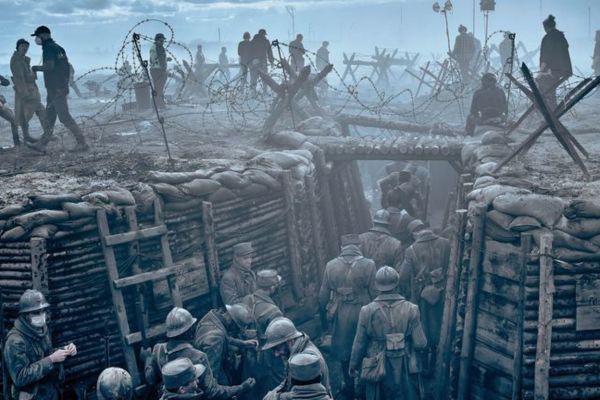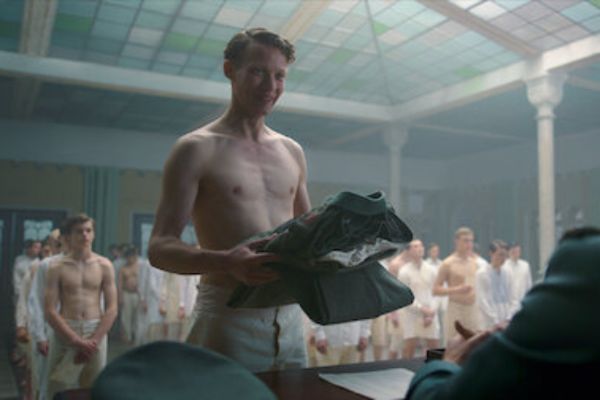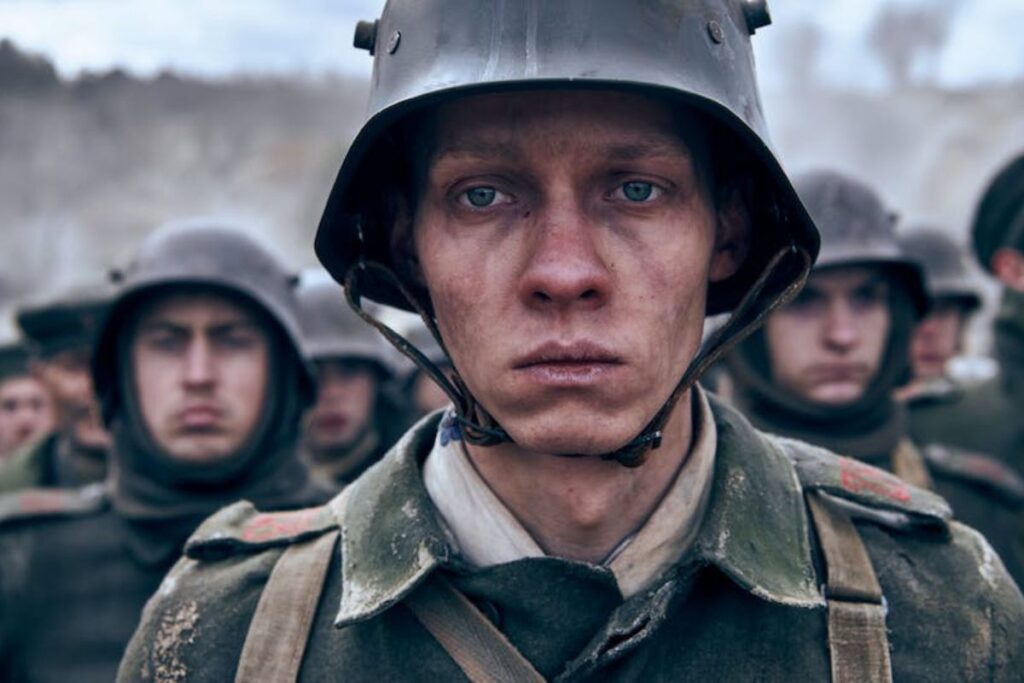The world is well aware of German Writer and World War I veteran Erich Maria Remarque’s famous classic anti-war novel All Quiet on the Western Front and has seen two screen adaptations by Lewis Milestone and Delbert Mann based on the novel. Edward Berger’s All Quiet on the Western Front is the first German film production based on Remarque’s novel. Even though Berger’s film is incredibly well made with detailed war sequences, some viewers argue that the film focuses much on war and lacks character development. However, there is the strongest similarity between the novel and the film that both portray the devastating impacts of war on this world and, most certainly, do not glorify it. A group of schoolboys idealize patriotism and join the armed forces but utterly regret their decisions when they experience the brutalities of war on the battlefield. They encounter death very closely at each and every moment as if the flow of life can get stopped at any moment. In an ocean of agonies, basic survival is the biggest question. In All Quiet on the Western Front, filmmaker Berger sometimes deviates from the novel, includes subplots, and digs deeper into World War I and its aftermath.
In 1917, a group of schoolboys, Paul Baumer (Felix Kammerer), Albert Kropp (Aaron Hilmer), Franz Muller (Moritz Klaus), and Ludwig Behm (Adrian Grunewald), listen to a patriotic speech by a school teacher and get so inspired by the idealism of patriotism that they end up enlisting themselves in the German Imperial Army and are ready to fight for their motherland. However, they get to know and feel the brutalities of war when they are taken to Northern France where Germans are fighting the French. Paul receives the recycled uniform of a dead soldier. The boys meet and befriend a senior soldier named Stanislaus ‘Kat’ Katczinsky (Albrecht Schuch). Ludwig is killed in the war on the first night.

On the parallel track of the story, Matthias Erzberger (Daniel Bruhl) meets the German authorities on 7th November 1918 and vouches for Armistice with the Allies to stop Germany’s mounting losses and deaths in the war. Paul and Kat steal a goose from a French farm. Franz has sex with a French woman and brings her scarf as a souvenir.
On 9th November 1918, German delegates led by Erzberger boards the train to The Forest of Compiegne for initiating armistice negotiations with the Allies. Paul and his team trace the dead bodies of sixty young German soldiers who have been killed by gas. General Friedrichs possesses strong German pride and ego, opposes the armistice, and orders an attack on the French before the Armistice takes place. Paul and his squad members intensely fight the French army on the frontline.
The armistice talks begin between the Allies and the German authorities. On 10th November 1918, Supreme Allied Commander Ferdinand Foch gives a 72-hour deadline for the German authorities to accept the non-negotiable allied conditions. French Saint-Chamond tanks crush the German army. Albert is killed by a flamethrower while attempting to surrender. Franz gets separated from his squad. In the no man’s land, Paul repeatedly stabs a French soldier but becomes utterly remorseful and begs forgiveness when he slowly dies.
The German delegates come to know about the abdication of Kaiser Wilhelm II as the German emperor. Field Marshal Paul Von Hindenburg instructs Erzberger to accept the Allied terms for the armistice. The German soldiers return to the barracks and celebrate the end of the war. Paul reunites with senior soldier Tjaden and gives him Franz’s scarf. When Paul and Kat bring food for him, an utterly depressed and injured Tjaden mutilates his throat with the fork and subsequently dies there.

The German delegates accept Allied terms and conditions for the armistice which will take effect from 11 AM. General Friedrichs doesn’t want to lose the war like a coward. He orders an all-out attack on the French army at 10:45 AM. Paul kills several French soldiers before a French soldier spears his body with a bayonet from behind. The monstrous war comes to an end. As Paul comes out of the Trench trembling, all is quiet on the Western Front. Paul succumbs to his injuries. In the end, a new German recruit collects Franz’s scarf but not Paul’s dog tag.
One of the most important questions raised for this film is why filmmaker Edward Berger shows the armistice negotiations on a parallel track when it is not mentioned in Erich Maria Remarque’s novel. Edward Berger has made this film in 2022 and the world is pretty much aware of all the reasons behind World War II. He has taken the liberty to go beyond the novel and dig deeper into the reasons for one of the worst wars that mankind has ever experienced. There is no denying the fact that Germany lost its vanity and suffered serious consequences as per the non-negotiable terms and conditions of the armistice. So, even though the nation was forced to accept the armistice, the suppressed fire was always there inside the nation to rise again and counter it, which had a strong influence on the rise of Nazism and Adolf Hitler as the Fuhrer. So, through this film, Berger shows that the armistice had a strong impact on World War II. When Remarque wrote the novel and Lewis Milestone made the film, the world was yet to experience World War II. So, the armistice negotiations were not part of their work. Filmmaker Edward Berger makes this film at a time when world politics is moving toward the right wing including countries like USA, UK, Hungary, Italy, etc. Probably, he wants to warn the world of the consequences of ultra-nationalism. The fate of Germany post World War I and II is vividly documented in countless history books throughout the world.
Apart from the armistice, the film deviates from the novel in a few scenes. The film does not cover Paul’s return to his home and his struggle to cope with his family. The war has engulfed his mind so intensely that he can’t adapt to his own family atmosphere. Many Germans complain that the film focuses more on dramatizing war than character development. There are only a few limited mentions of tanks and planes in the novel whereas a detailed battle with Saint-Chamond tanks and airplanes is shown in the film. In the film, Albert is killed by a flamethrower, but in the novel, Albert is amputated but not killed. Then, he is sent for prosthetics. Remarque vividly shows the trauma and struggle of a soldier to integrate into the stream of life. General Friedrichs is a fictional character too and not mentioned in the novel. Edward Berger created this character to show the hypocrisy of the war masterminds. They order an attack on the enemy line while enjoying lavish dinners at their mansions. However, only generals or commanders can’t be blamed for the warfare. The primary reason for war is human stupidity. Multiple training sessions of the young recruits by the German Imperial Army are mentioned in the novel. However, Remarque strongly criticized the useless training sessions, and as per him, the new German recruits were pushed to the frontline unprepared resulting in the loss of countless young lives.
Through All Quiet on the Western Front, Edward Berger vividly shows the brutalities of war. He also points out the hypocrisy of the senior generals. When the young boys fight the enemies on the frontline, General Friedrichs enjoys a lavish dinner in an elite mansion. War has never done any good for anybody. It only results in massacres and bloodshed. Countless innocent civilians are killed in the name of false ideologies and fake egos. Ultra-nationalism is an extremely dangerous phenomenon. More than 20 million people lost their lives in World War I and 85 million in World War II. In spite of monstrous consequences, there is no end to human stupidity and the cycle of war continues. Paul receives the recycled uniform of a dead soldier which was washed and ironed before the handover. Then, the person at the counter removes the name tag. When one soldier dies, another young recruit waits for his fate on the frontline. One of the most horrendous pictures of the film is a mutilated dead body hanging from a tree. This picture alone speaks a thousand words about the devastation of any war. Still, humans are yet to learn restraint. The existences of countless soldiers only remain in the dog tags.
Even though the screenplay, which is written by Lesley Paterson, Ian Stokell, and Edward Berger himself, deviates from Remarque’s novel in multiple scenes, All Quiet on the Western Front is an incredibly well-made film. The complex war scenes in the trenches reflect the supreme level of superiority of Berger’s filmmaking craft. Devastations of World War I and human casualties are portrayed in detail throughout the film. Overall, it is an utterly dynamic film. The entire cast delivers outstanding performances. The brutalities of war are reflected in their facial expressions. Felix Kammerer as Paul Baumer is outstanding as he can efficiently play the character stuck in that devastating and claustrophobic atmosphere of World War I throughout the film.
James Friend’s extremely dynamic cinematography realistically captures the innumerable atrocities of World War I. The greyish screen filled with smoke makes the viewers feel the agonies and trauma suffered by countless innocent lives. However, in the non-war scenes, Friend captures magnificent natural beauty as if the moments of pure bliss are an illusion in the midst of a monstrous war. Sven Budelmann’s efficient editing along with Friend’s cinematography makes the film extremely dynamic. The complex sequences of trench warfare flow incredibly smoothly. Volker Bertelmann’s remarkable 3-note harmonium background score resonates with the horrendous war scenes. The other part of the background score reflects optimism as if the boys can feel the warmth of home despite the war atrocities.
Production design, costumes, art directions, and sound designs make outstanding contributions to the film. The works of prosthetics in the film are so realistic that the viewers get terrified and numb. When the credit rolls, there is no sound on the screen as if the entire world is mourning the countless losses of a hellish war and has lost its voice. All Quiet on the Western Front has received numerous awards across the globe. It received nine nominations and won four Oscars for Best International Feature Film, Best Cinematography, Best Production Design, and Best Original Score at the 95th Academy Awards. It was nominated for Best Foreign Language Film at the 80th Golden Globe Awards. It received fourteen nominations and won seven BAFTA Awards at the 76th BAFTA Awards.
